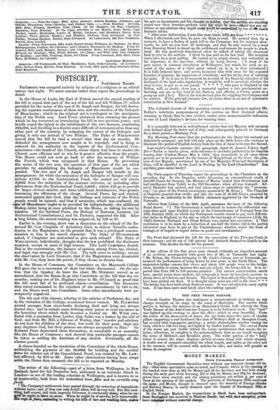The writer of the following--part of a letter from Wellington
in New Zealand, dated the 5th December last, addressed to an intimate friend in London—hi one of the leading colonists at Wellington, and is known to us as trustworthy, both from his undoubted bona „Pea and an enviable sang /raid
' " The Company's settlements have passed through the reduction of expenditure without harm; and, if they can only be left alone, will do very well. But this med- "dlin ' half-crazed, and most impotent Governor, is continually doing, when for oar good he ought to leave us alone. When he might be of service, be is immoveable. h is rage de faire, extending to writing a his bills of fare and washing-lists, makes his acts so inconsistent and his changes so sudden, that the settlers are standing guard over their breeches-pockets until hie reign; oiler,---ti raid lest any ex- ertions or speculations they might male rffieFlre-asetwag by One of tilb many fantastic tricks. i;14-&-, " After some deliberation, I sent him your letter, wittabeifrom When I afterwards saw him, he gave me them to read. He seemed then, for a moment, to have a feeling of good-will to the Company; but five minutes after- wards, he told me you were all bankrupt, and that he only waited for a word from Downing Street to break up the settlements and remove the people to Auck- land. He was positively demoniacal when he talked of taking the absentee? land to give to the settlers. I think he has paid us his last visit. His reception must have been most galling. He landed on an empty strand, and embarked at his departure, in the day-time, without its being known. [A story of his past career, in common circulation at Wellington, but which we omit on ac- count of the names of a third party mixed up in it, is here introduced.] It is fully believed here; and serves to excuse him with some for his repeated breaches of promise, his suspicions of everybody, and his tricky way of carrying his point. If he is not to be removed on account of his financial mistakes or his disregard of the land-sales regulations, it would be well to ascertain whether the story is true, to put us on our guard. • * • * ", who goes to England by the Nelson, will, no doubt, show you a memorial against a late proclamation au- thorizing any one to buy land of the Natives, and offering a Grown grant at a penny an acre [fee]. This is the last-devised plan for crippling the Company and its settlers. If the principle becomes law, of course there is an end of systematio colonization in New Zealand."
The Colonial Gazette of this morning enters a strong protest against Mr. Buller's indefinite postponement of his motion on New Zealand affairs; seeming to think that he has yielded, under some unaccountable influence, to one of Lord Stanley's devices for wasting time.


























 Previous page
Previous page